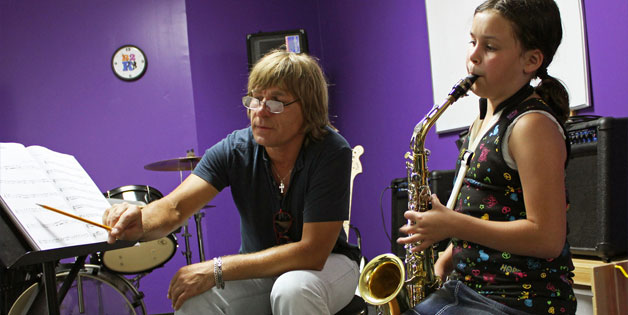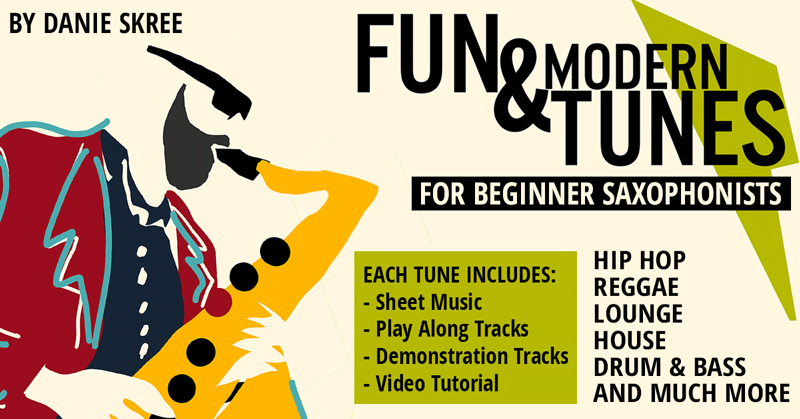How to Find a Great Saxophone Teacher
 So, are you interested in learning how to play the saxophone? Perhaps you’ve been playing for a few years on your own and you’ve decided now is the time to take it to the next level. Or maybe your child is interested in the instrument, but needs more one on one time with an expert rather than large-group school lessons. Most band directors would agree that private lessons are the best way to encourage a child’s natural musical ability. Now that you’ve decided it’s time to look for a private lesson teacher, here are some things to consider:
So, are you interested in learning how to play the saxophone? Perhaps you’ve been playing for a few years on your own and you’ve decided now is the time to take it to the next level. Or maybe your child is interested in the instrument, but needs more one on one time with an expert rather than large-group school lessons. Most band directors would agree that private lessons are the best way to encourage a child’s natural musical ability. Now that you’ve decided it’s time to look for a private lesson teacher, here are some things to consider:
Credentials
First and foremost, your prospective teacher should have some kind of credentials on the instrument. A music performance degree would be preferable, although not a necessity. You can find out if teaching is their main ‘gig’ or something on the side of a regular job for a little extra cash. The teacher who teaches full-time might have more experience dealing with all sorts of situations over the years, but the teacher teaching as a side job might be doing it more for fun than anything else.
An experienced teacher is probably the best choice if you’re looking for the best teacher in town. Somebody who has been teaching private lessons for a long time should have the answers for almost all of your questions. A teacher who has a wait list is probably worth the wait as most of his or her students have probably been in the studio for a long time and that is a good sign.
But I would also say don’t shy away from a college student, depending on your needs. Teachers of the future have to start sometime. You may find a motivated music student at your local college looking to gain teaching experience and earn a few extra bucks. He or she will probably be studying with a local college professor and may have a similar teaching style. This can also be beneficial if that same professor is unavailable.
A Performer
Typically when looking for a teacher, you are going to want to find somebody who has experience performing that instrument. After all, your goal is probably to perform on your instrument better, so seek a teacher who is frequently paid to play the instrument. Even if you have no aspirations of public performance and you play your instrument for pure joy, you still want to find a teacher who is capable enough on the instrument that on occasion they are paid to put air through the instrument and wiggle their fingers. After all, your goal in seeking private lessons should resemble wanting to better yourself at the instrument.
Often times your prospective teacher will have advanced mechanical knowledge of the instrument. This can be advantageous for students for several reasons. Students don’t usually handle the instrument the same way a professional does, and may induce unnecessary stress on the instrument. A good instructor should be able to identify any of those issues and make corrections, as well as find issues with the instrument the student might not even know he/she had. And if you’re really lucky, the instructor might have enough repair experience they might be able to make fixes on the spot saving you time away from your instrument and money going to a repair technician.
Teachers will often post performance schedules of venues they will be performing publicly. It may be on their studio door, or on their website. And if not, don’t be afraid to ask when the next performance is. I’m sure they would appreciate playing to an audience they know. And besides, live music needs to be supported in order to keep the tradition of working musicians in our society around.
Organized
I would also recommend finding a teacher who is somewhat organized. Not to say you have to find someone who is more “Type A,” but at least someone who will return calls and emails promptly (a day or 2, depending on the subject) and keep your payment and attendance records. The last thing you want is a teacher who may forget when your lesson is. Other signs your prospective teacher has some sense of organization is a somewhat up to date bio or website. Nothing is more out of place than a 40 year old teacher who’s bio says he currently plays lead in a college ensemble (unless of course that is recent).
If your prospective teacher has an actual printed lesson policy, you know they take the lessons seriously. Don’t be surprised if your teacher gives you a statement of how much is owed and the lesson dates for the month. Expect to pay for lessons on a per month basis. For the most part, long gone are the days of paying $5 per lesson and not paying if you decided not to show up. For many teachers, teaching private lessons is a bulk of their income, and they charge monthly so they have a rough idea on how much income they will be taking in. Believe it or not, they have bills to pay just like everyone else. Often private lesson teachers operate as a business and you may have to write checks to “Mr. Sax Man, LLC.”
Location
Another thing to consider when looking for a private teacher is location. A good place to start is a local music store or music conservatory. Also if you live near a university that has a music program, you may want to contact the music department and get in touch with faculty. They may either be able to take you as a private student or refer you to their top students at the university. Referrals are often an excellent way to find good teachers. Ask the best players in your school who they take lessons from, or ask the band director for a recommendation. Band directors are often tied into the local music scene and know who the best private teachers are.
You may find out there is a great teacher, but they teach a little further out than you would like. I know the price of gas is high, but finding the right teacher who can help unlock your full potential is certainly worth the extra time traveling. You can use the extra time listening to music relevant to your lessons, a great way to practice while not being physically able to play your horn.
Lastly, now that it’s 2011, some great teachers are offering lessons over Skype (video chat). Most modern computers built within the last 6 or more years have built-in web cams and microphones. You will need some type of high speed internet connection (at least faster than dial-up) for decent call quality, but the Skype software is free. This is great to check out if there are no other reasonable solutions for private study your area or if there is a particular player whom you would like to study with but doesn’t live nearby.
The Right One For You
All in all, at the end of the day you want to find a private teacher that is right for you. And that honestly supersedes all of my previous thoughts. There is no one type of teacher who’s great for everyone. You want to find somebody that will work with your style of learning the best. You will probably know within the first month what expectations your teacher has, and if they are either too high or too low.
Of course, that the success you have with lessons lies with YOU. Your teacher will expect you to be practicing regularly in between lessons, that’s how it works. Your teacher give you an assignment to practice, you practice everyday until your next lesson and play the assignment to the best of your ability, they critique and give you tips on how to play it better, rinse and repeat. Don’t be surprised even if you play something perfectly if your teacher has some comments. No performance is perfect and remember, it’s their job to find ways you can be a better performer. That’s what you pay them to do.
Now go out there and find a teacher. And remember: Practice everyday you choose to eat.
Photo by woodleywonderworks






June 1, 2011 @ 4:43 pm
Hi, I’m visiting scholar. I’d like to have a lesson for Saxophone. Please notify me of information about where I can find a lesson place near UC village, Albany.
June 16, 2011 @ 9:31 pm
Hello Kwang,
Thanks for stopping by!
I just now saw your comment, so forgive me for responding so much later. Since I don’t personally know of any teachers in Albany, here’s what I suggest:
* Go to the head of the music department at the school and ask for a recommendation. Perhaps one of the teachers or even a student could be a good fit.
* Go to websites like http://www.musicteachersnet.com or http://takelessons.com and see who you can find in your neighborhood.
I hope all of that helps!
Doron
May 15, 2013 @ 5:07 am
I teach saxophone in Exeter, NH and promote my service with my website http://saxophonestyles.yolasite.com/ via online advertising such http://www.craigslist.org and http://www.saxophone.org – Many teachers prefer those advertising hosts because they don’t charge a fee to the instructors, unlike the musicteachers/takelessons websites. which charge fees or take percentages of the earnings.
August 3, 2015 @ 12:07 pm
Our website specialises in Saxophone lessons by high profile Saxophone players such as Andy Sheppard, James Morton, Pee Wee Ellis, Craig Crofton amongst others. We aim to provide professional lessons from the best performing artists in the business. To be able to play like a Pro learn from one. Please visit http://www.promusictutor.com and choose Saxophone from the homepage.
July 25, 2016 @ 2:54 pm
Hi my name is chidozie. I come from Nigeria. I play the sax and I am really good but I want to be better.
The Perfect Notes To Play On Alto Saxophone – ScionAv
November 26, 2022 @ 6:39 pm
[…] puffing up during loud music. Allow that air to flow freely, as if nothing had happened, while saxophone teachers all over the world cringe. Rather than becoming concerned about the aesthetic aspects of playing […]